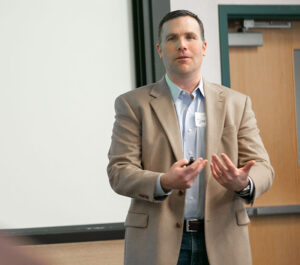Tech Titans on Trial: Will Antitrust Lawsuits Impact Entrepreneurs?

A series of antitrust lawsuits recently filed against technology giants such as Amazon and Google could shape the future of e-commerce and innovation, according to David Nersessian P’25, a professor of law at Babson College.
The high-profile cases—targeting two of the biggest tech companies in the world—could have major implications for entrepreneurs.
“This litigation is going to take a long time, but it’s potentially very significant,” Nersessian said. “If the judiciary agrees that there needs to be a broader understanding of market power beyond consumer costs and pricing, that would be groundbreaking for antitrust law, and it could change the landscape considerably for business owners.”
Nersessian, who teaches business law, shared his insights on the recent cases and what they could mean for entrepreneurs.
The Antitrust Lawsuits
The Federal Trade Commission (FTC) filed a lawsuit against Amazon in late September alleging that the online seller uses its market power to stifle competition. The FTC argues that Amazon imposes excessive fees and conditions on sellers, uses its data to favor its own products and services, and restricts sellers and customers from switching to other platforms. Amazon argues that it operates in a highly competitive and dynamic market that benefits consumers and sellers alike.

The Department of Justice, meanwhile, is currently arguing in federal court that Google abused its online search dominance in violation of U.S. antitrust laws. The government alleges that the search titan is using exclusive contracts, preferential treatment, and other tactics to keep its monopoly over search and search advertising. Google contends that it faces robust competition and enjoys 90% of the market share because it offers the best product.
The FTC’s decision to take action against Amazon and Google signals a significant shift in antitrust enforcement, Nersessian said. For the past two decades, antitrust cases have been relatively scarce, with a focus on pricing-related issues. However, the changing marketplace dynamics and increased scrutiny have breathed new life into antitrust enforcement.
“We’ve had massive technological and marketplace shifts over the past few decades, but antitrust enforcement hasn’t kept pace,” Nersessian said. “I think there’s a growing recognition that the old tools aren’t working.”
Entrepreneurs should take note of this renewed focus on antitrust regulations.
Expanding the Definition of Market Power
Traditionally, antitrust cases were linked to pricing and how it impacted consumers. However, these cases are looking beyond pricing and exploring the concept of market power in a broader sense. They are examining access to markets and the influence these tech giants have on consumers’ choices.
“They’re looking to basically broaden the understanding of what it means to be a monopolist, and what anticompetition means to market power that is not necessarily reflected in price,” Nersessian said.
“The behavior that’s alleged is that these companies are too big, and they’re using their market power to concentrate business on their own platforms that otherwise could be taken off to other channels.”
Entrepreneurs should understand that market power can encompass various aspects, such as control over search engine results and access to specific markets, Nersessian said. He added, “It’s also worth noting that these issues present global challenges for large companies. Just a few days ago, for example, Amazon and Facebook parent Meta both settled anticompetition disputes in the United Kingdom involving their online marketplaces.”
The Importance of Adaptation
As an entrepreneur, it’s crucial to monitor legal developments and be prepared to pivot in response to potential changes in the digital marketplace. If Amazon’s business practices are significantly altered as a result of its case, it could impact how businesses interact with the platform.
Antitrust lawsuits are famously slow moving, Nersessian said, so it’s unclear as to when these changes will occur. For now, the antitrust cases against Amazon and Google are pivotal in the world of antitrust enforcement, with potential consequences down the line for entrepreneurs and businesses. These cases serve as a reminder of the ever-evolving nature of the digital marketplace. Entrepreneurs should keep a close eye on these developments and be ready to adapt to changing regulations and market dynamics, Nersessian said.
Posted in Insights




